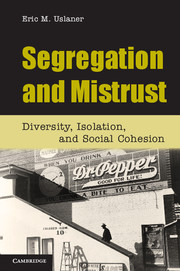Book contents
- Frontmatter
- Contents
- Preface
- 1 Trust, Diversity, and Segregation
- 2 Contact, Diversity, and Segregation
- 3 Building Trust in a Segregated Society
- 4 Canada
- 5 The United Kingdom
- 6 Sweden and Australia
- 7 Altruism and Segregation
- 8 Where You Sit Depends Upon Where You Stand
- 9 The Farmer’s Daughter and Intergroup Contact
- References
- Index
3 - Building Trust in a Segregated Society
The United States
Published online by Cambridge University Press: 05 November 2012
- Frontmatter
- Contents
- Preface
- 1 Trust, Diversity, and Segregation
- 2 Contact, Diversity, and Segregation
- 3 Building Trust in a Segregated Society
- 4 Canada
- 5 The United Kingdom
- 6 Sweden and Australia
- 7 Altruism and Segregation
- 8 Where You Sit Depends Upon Where You Stand
- 9 The Farmer’s Daughter and Intergroup Contact
- References
- Index
Summary
It is very appropriate then that from this Cradle of the Confederacy, this very Heart of the Great Anglo-Saxon Southland, that today we sound the drum for freedom as have our generations of forebears before us done, time and time again through history. Let us rise to the call of freedom-loving blood that is in us and send our answer to the tyranny that clanks its chains upon the South. In the name of the greatest people that have ever trod this earth, I draw the line in the dust and toss the gauntlet before the feet of tyranny … and I say … segregation today … segregation tomorrow … segregation forever.
Inaugural address of Governor George C. Wallace of Alabama, January 14, 1963Ain’t gonna let segregation turn me around
Turn me around, turn me around
Ain’t gonna let segregation turn me around
I’m gonna keep on a-walkin’, keep on a-talkin’
Marchin’ up to freedom’s land
Children’s song from the civil rights movement in the United States
All persons shall be entitled to be free, at any establishment or place, from discrimination or segregation of any kind on the ground of race, color, religion, or national origin, if such discrimination or segregation is or purports to be required by any law, statute, ordinance, regulation, rule, or order of a State or any agency or political subdivision thereof.
Title II, Section 202, Civil Rights Act of 1964Americans once were a trusting people. In 1960, almost 60 percent of Americans believed that “most people can be trusted.” Throughout the 1960s over half of Americans were trusters, but the 1970s brought a precipitous decline and by the 1990s only 38 percent of Americans gave trusting responses (Uslaner, 2002, 6–7). By 2006 and 2008, barely more than a third did.
The United States should be a high-trusting country. It was America, after all, where Tocqueville (1945, 122–3) uncovered “self-interest rightly understood,” the idea that people base their actions on core values (religious for Tocqueville) that lead them to think beyond gains for themselves. “Self-interest rightly understood” is now widely acknowledged to be the root of generalized trust.
Information
- Type
- Chapter
- Information
- Segregation and MistrustDiversity, Isolation, and Social Cohesion, pp. 69 - 89Publisher: Cambridge University PressPrint publication year: 2012
